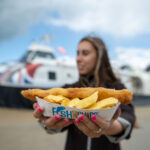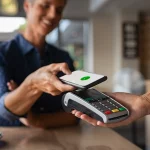Carol Hulme has turned to technology to help improve operations at her two fish and chip takeaways in Anglesey
The small island of Anglesey, just off the North Wales coast, is a tourist hot spot in the summer with holidaymakers drawn to its picturesque scenery and stunning beaches.
One of the most popular locations is Benllech on the island’s east coast where Carol Hulme and husband Mike have operated Finney’s @ The Golden Fry since 2009.
On the north coast in Amlwch is their second shop, Finney’s @ Port Chippy. Carol’s local chippy as a child, she couldn’t resist the opportunity to buy the business when it came up for sale in 2018.
Although only nine miles apart, the two takeaways are completely different operations: Amlwch serves the local community, whereas Benllech is a tourist heavy-shop that also has a strong local following.
Self-serve kiosk
To ease queues in the summer and avoid losing the locals to elsewhere, a self-serve kiosk was introduced last year at Benllech. Accompanied by a digital screen in the window that alerts customers choosing to wait outside when their order is ready for collection, it has helped streamline the process. And, with two other chip shops close by – neither offering this facility – it’s kept Finney’s one step ahead of the competition.
“If there are queues, customers can go straight to the kiosk and don’t have to wait for a server to come available,” says Carol. “Some days it’s used more than others, it just depends on the queue and also, I would probably say, the age of the customer. The older they are the less likely they’re going to use the kiosk, but generally it’s being used more and more.”
Investing in this new ordering technology has also helped eliminate server errors and manage customer expectations, with Carol adding: “The screen has an estimated time on it and the more tickets you have, the more time is added on. It means customers know how long the wait is before they even walk in the door.”
With Covid fast-tracking everyone into using digital ordering more often, Finney’s has seen online sales grow. Across the year, Carol estimates around 30% of its orders are now placed online.
With this in mind, Finney’s has just introduced a digital loyalty scheme. Customers register online and are given a barcode to scan. For every pound they spend, they accrue a point which can be exchanged for money off future meals.
“Like everybody else, we’ve had to put our prices up so we’re introducing this points scheme to then reward people that use us regularly and also to give something back, which I think is going to become even more important with the cost-of-living crisis continuing.”
Although a cost to the business, Carol prefers to see both the kiosk and the loyalty scheme as worthwhile long-term investments.
“It’s the way things are going,” she says. “You need to bring yourself into the 21st Century otherwise you’ll get left behind.”
Having increased the price of regular fish, chips and peas from £8.80 to £9.20, at the other end of the scale Finney’s has introduced several £5 and under meal deals. These include popular combos such as fish goujons with chips and tartare sauce; fishcakes, chips and gravy; and sausage, chips, peas, gravy and scraps.
“So far they are going really well,” says Carol. “A lot of people are using them. Potentially, rather than somebody ordering one fish and chips between two, they’re having two smaller ones. Or they might have a bigger one and then a smaller one for the kids rather than mini fish and chips.
“Fish and chips isn’t cheap anymore. Our prices are where they need to be but we appreciate that everybody is struggling with money. So if somebody wants fish and chips but money is a bit tight, then they can have a fish goujon meal. If they want a bigger portion, they can also pay for a bigger portion.
“Hopefully this and the loyalty points will help get more people in.”
Gluten free
While battered sprouts, pigs in blankets and turkey and cranberry loaded chips are on the menu for a limited time over Christmas, its gluten free offering is a mainstay.
At Finney’s Golden Fry, almost 70% of the menu is gluten free and it’s an important pull, attracting customers from far and wide for its fish and chips, fish cakes, chicken fry-its, curries and jacket potatoes.
Taking the issue of cross-contamination seriously, the pair had a frying range designed with features that would make catering for coeliacs – and anyone generally cutting out gluten – easier. For example, drain holes in the hot boxes were blocked to prevent oil contamination from gluten containing products, while a bain marie was placed at each end to keep its gluten free sauces well away from its gluten containing puddings.
“We get so many people coming from miles away just for our gluten free food and we get people ask daily if our food is suitable for coeliacs. It’s definitely the best thing that we did.”
It’s not just her own shops that Carol gives time to. Recently, when a fellow shop owner and friend fell ill, Carol pitched in and covered a number of shifts at the Fiddler’s Elbow, 130 miles away in Leintwardine, saving them from closing. To Carol, it was all part and parcel of being involved in the industry that she loves.
“I just wanted to help,” she says. “The fish and chip industry is really good for that. You can ask anybody anything and they’ll tell you the answer. If anybody asks me anything, I’ll tell them because we need the industry to survive. It’s not just about our own shops, we have to try and help everyone so that we will be here for a few more hundred years.”






